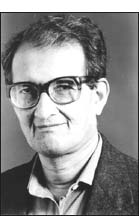

Dr Amartya Kumar Sen, noted economist and philosopher, defied some of the popular ‘theories’ or ‘laws’ of economics. And when the Royal Swedish Academy awarded him the Nobel Prize in Economic Sciences for 1998, it recognised his work, especially his studies on famines and his “key contributions to welfare economics”. He was the first Asian economist and the sixth Indian to receive the Nobel Prize.
According to well-known British economist Thomas Malthus famine, disease and war were the result of overpopulation. But when Amartya Sen analysed the causes of famine and starvation, he came to the conclusion that shortage of food supply was not just the cause of famine, other factors also contributed to it. Perhaps he was inspired to take up economics because he was himself a witness to the Bengal Famine of 1943. He believed that the famine was the result of man himself rather than natural causes. As a young boy of ten then, he recalled, “The streets were full of emaciated looking faces and people were dying in very large numbers. It made me think about what causes famine. Thirty years later, I was still quite haunted by the memories of that period.”
Amartya Kumar Sen was born at Shantiniketan, as his father was working there. In fact he was given the name ‘Amartya’ or ‘the one who deserves immortality’ by none other than Rabindranath Tagore himself. Rabindranath Tagore had predicted that the child would go on to earn a lot of flame and recognition for himself and the country.
He studied at Shantiniketan and topped in his intermediate examination. In 1953, he joined Presidency College in Calcutta for his graduation in economics. Then he went to England and joined Cambridge University for his post-graduation and doctorate. When he came back to India, he joined Jadavpur University as professor of economics. He was then just 24.
In 1963 he moved on to Delhi School of Economics (DSE), where he taught for eight years. His fellow professors were V.K.R.V. Rao and K.N. Raj, who were renowned economists. He was associated with DSE till 1971. Then he shifted base to England and joined London School of Economics. He later moved on to Oxford as professor of economics and philosophy. He stayed there for almost a decade before taking over as Master of Trinity College at Cambridge.
Dr Sen has authored about 21 books and over 200 research papers and articles. He has tried to analyse the relation between poverty and famine. Basing his research on the Bengal Famine of 1943, he came to the conclusion that famines are actually man-made catastrophes and not natural disasters. According to him, the famine was the result of the poverty prevalent in the area. The poor did not have the buying capacity. When the prices of food grains soared and the poor did not get a raise in their salaries or supplement their income in some other way, they had to starve. Dr Sen also proved that the main reason behind poverty was illiteracy.
Amartya Sen was married to Navnita Dev in 1960. She is a famous Bengali writer. They were divorced in 1974. They have two children. In 1977, he married a student of DSE named Eva, but she died in 1985. Then he went to England to join London School of Economics. When he joined Trinity College, he met Emma Rothschild who was also teaching there. He later married her.
In recognition of his work, in January 1999, the Indian Government honoured him with India’s highest civilian award, the Bharat Ratna.